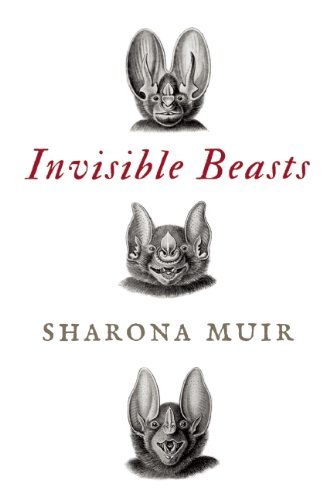 Another month, another Early Reviewer book. This time I won Invisible Beasts by Sharona Muir. I was particularly fortunate this month because 752 folks requested this, but only 20 received a book. Lucky me!
Another month, another Early Reviewer book. This time I won Invisible Beasts by Sharona Muir. I was particularly fortunate this month because 752 folks requested this, but only 20 received a book. Lucky me!
I’ve found that it is quite difficult for me to write a review for this book. I finished it more than a week ago, and I’ve been thinking about it on and off since then, but I’m not sure that I quite know what to say. While marketed as a novel, Invisible Beasts certainly seems more like a collection of short stories/essays that have an ongoing theme. However, as the stories progress, the common thread that ties them all together becomes somewhat tenuous. The main idea in these stories is that the protagonist, Sophie, has the (incredibly rare, inherited) ability to see invisible animals. These critters are not particularly uncommon and she encounters them frequently in her daily life. Each chapter of this “novel” reads kind of like a journal entry written by Sophie and serves (nominally) to describe one specific invisible creature. Sometimes she discusses the habits/behaviors of these animals in detail, sometimes she just mentions them briefly as a passing detail of her life.
There are also some very strong environmental/conservationist themes hinted at in these stories. Muir takes the fact that humans are generally terrible at seeing/understanding so much about the world around us and exaggerates/expands this ignorance to include a host of invisible creatures that are equally threatened. While this might seems purely fantastical at first blush, it’s not actually too far-fetched. After all, up until ~350 years ago (before the existence of microorganims were observed/confirmed with early microscopes), most bacteria/viruses/single cell organisms were essentially “invisible”. One of Muir’s chief points seems to be that there is so much that we’re obviously missing out on; if we don’t reorganize our priorities to emphasize conservation and stewardship and discovery, chances are incredibly high that we’ll miss out on the opportunity to learn something critically important. Case in point, the WWF estimates that over the past 30 years as many as 275 species have been eradicated from this planet EVERY DAY. (For the sake of completeness, their lowest-end estimate claims that a species goes extinct every other day – still an incredibly high rate.) Many of those species were never studied. And never will be. These numbers are haunting.
Early in this book, Sophie claims that she’s writing these entries in an attempt to help her beloved invisible animals; because they are invisible, they have no advocate. However, this self-proclaimed thesis, while admirable, is never revisited and seems largely ignored throughout the rest of the book. Instead of building towards something, the ensuing individual chapters revert to one-off vignettes that are only loosely connected to the preceding entries. While I really enjoyed a lot of the concepts in these stories, it was difficult for me to get over how disjointed the book felt from beginning to end. From chapter to chapter, the voice/style varies A TON, ranging from silly to lyrical to scientifically technical to deeply philosophical, which makes it challenging to view as a cohesive work. Add this to the fact that the overarching ideas are a little inconsistent and the momentum of the book just seems to fade as time goes on… Individually, some of the stories/essays were quite lovely (I particularly enjoyed The Riddle of Invisible Dogs and The Hypnogator) and the quality of the writing remains quite strong throughout, but it was easy to tell that several of these chapters were initially written and published as separate pieces and then stitched together.
I imagine that if I re-read Invisible Beasts and viewed each section as its own separate thing I would enjoy it a lot more… In any case, I’m certainly not unhappy that I read this, but I was hoping to enjoy it more than I did. I give it 3.5 stars (out of 5).
— — —
Miles run in 2014: 159.6
Books read in 2014: 40